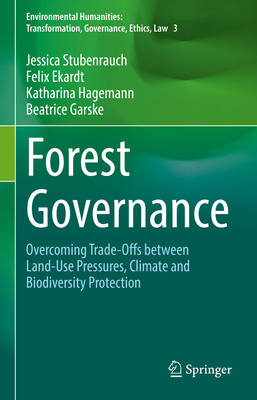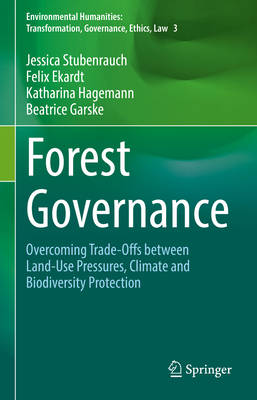
- Retrait gratuit dans votre magasin Club
- 7.000.000 titres dans notre catalogue
- Payer en toute sécurité
- Toujours un magasin près de chez vous
- Retrait gratuit dans votre magasin Club
- 7.000.0000 titres dans notre catalogue
- Payer en toute sécurité
- Toujours un magasin près de chez vous
Forest Governance
Overcoming Trade-Offs Between Land-Use Pressures, Climate and Biodiversity Protection
Jessica Stubenrauch, Felix Ekardt, Katharina Hagemann, Beatrice GarskeDescription
This book analyses and develops overarching concepts for forest policy and forest governance and includes a detailed investigation into the historical discussion on forests. It examines opportunities and limits for negative emissions in a sector that - like peatlands - appears significantly less ambivalent compared to highly technical large-scale forms of climate geoengineering. The analysis shows that the binding climate and biodiversity targets under international law are much more ambitious than most people assume. Measured against that, the volume critically reviews the potentials of afforestation and reforestation for climate mitigation, which is often presented as the new saviour to fulfil the commitments of the Paris Agreement and to reach climate neutrality in the future. It becomes clear that ultimately only biodiverse and thus resilient forests can function as a carbon sink in the long term. The volume shows that the existing European and international forest governance approaches fail to comply with these targets and insights. Furthermore, the book develops a bundle of policy measures. Quantity governance systems for livestock farming, fossil fuels and similar drivers of deforestations represent the most important approach. They are most effective when not directly targeting forests due to their heterogeneity but central damaging factors. With regard to the dominant regulatory and subsidy-based governance for forests we show that it remains necessary to supplement these quantity governance systems with certain easily graspable and thus controllable regulatory and subsidy regulations such as a regulatory protection of old-growth forests with almost no exceptions; extension of the livestock-to-land-ratio established in organic farming to all farming; far-reaching restriction of bioenergy use to certain residues flanked by import bans; and a national and international complete conversion of all agricultural and forest subsidies to "public money for publicservices" to promote nature conservation and afforestation in addition to the quantity control systems.
Spécifications
Parties prenantes
- Auteur(s) :
- Editeur:
Contenu
- Nombre de pages :
- 241
- Langue:
- Anglais
- Collection :
Caractéristiques
- EAN:
- 9783030991838
- Date de parution :
- 23-04-22
- Format:
- Livre relié
- Format numérique:
- Genaaid
- Dimensions :
- 163 mm x 241 mm
- Poids :
- 576 g

Les avis
Nous publions uniquement les avis qui respectent les conditions requises. Consultez nos conditions pour les avis.






